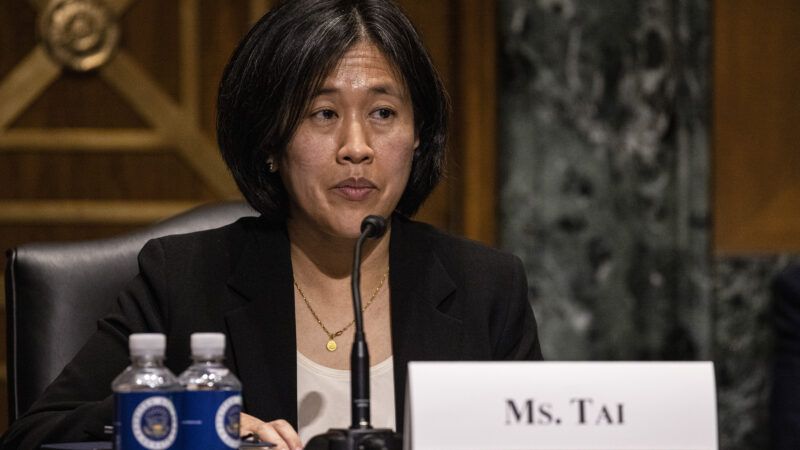Biden's Pick To Run Trade Policy, Katherine Tai, Promises More Efficient Protectionism
Trump's trade policies caused "a lot of disruption and consternation," Tai said at one point during Thursday's hearing. "I want to accomplish similar goals in a more effective process."

Near the very end of Thursday's confirmation hearing for Katherine Tai, President Joe Biden's pick to be the U.S. Trade Representative, there was a telling exchange between Tai and Sen. Pat Toomey (R–Penn.).
Toomey, an outspoken critic of former President Donald Trump's haphazard tariff policies, bluntly asked Tai what the goal of a trade deal ought to be. When the U.S. pursues trade agreements with other modern, developed nations, Toomey asked, "in your ideal world, would the goal of that trade agreement be to end up with a mutual and reciprocal zero-tariff, zero-quota, zero-obstacle-to-trade arrangement?"
"Maybe if you'd asked me that question five or 10 years ago," Tai replied, "I'd have been inclined to say 'yes.'"
Now, however, the best Tai could muster was to say "I'm not sure," adding that it would "depend on the specific facts." Like much of what she told senators during Thursday's hearing, it was a diplomatic and noncommittal response—but also, as Toomey described it, a "disappointing" one.
Tai spent most of the hearing steering away from making specific commitments, but the overall picture that emerged is one where Biden aims to cement some of Trump's protectionist impulses while turning away from the previous president's go-it-alone approach. Tai stressed the importance of working with countries that share America's economic and political values to counter the growing influence of China, for example. During her opening remarks to the committee, Tai said it was "critically important" for the U.S. to "have a strategic and coherent plan for holding China accountable to its promises and effectively competing with its model of state-directed economics." But she also emphasized Biden's goal of a so-called "worker-centric trade policy," which likely requires attaching more complicated labor requirements to future trade deals.
In many ways, the model for what a Biden/Tai trade policy might look like is already out there. Tai previously worked as the congressional Democrats' top negotiator on the United States–Mexico–Canada Agreement (USMCA) and helped shepherd some major union priorities into the deal. The AFL-CIO, which almost never endorses trade agreements, came out for the USMCA after some last-minute changes to artificially hike wages in Mexican automating plants and more strictly enforce labor standards in Mexico.
But even as Tai indicated a willingness to embrace more stringent enforcement of labor standards in current and future trade deals, she rebuffed a request from Sen. Elizabeth Warren (D–Mass.) that she include more oversight from labor and environmental interests in trade deals. Progressives like Warren are pushing Biden to use trade policy as leverage for a wide range of other policies—much as Trump viewed trade policy as a way to extract concessions from foreign governments.
"Tai is in an interesting position right now, trying to assuage the moderate and progressive wings of the Democratic party," says Inu Manak, a research fellow who covers trade policy for the libertarian Cato Institute. "Though I would say that skepticism about liberalization is likely to continue under the Biden administration."
Tai's unwillingness to commit to rolling back Trump's tariffs is another red flag—but not really a surprising one. Trump effectively shifted U.S. trade policy to the left, so it is unsurprising that the incoming Democratic administration would not want to do much differently.
Trump's trade policies caused "a lot of disruption and consternation," Tai said at one point during Thursday's hearing. "I want to accomplish similar goals in a more effective process."


Show Comments (64)